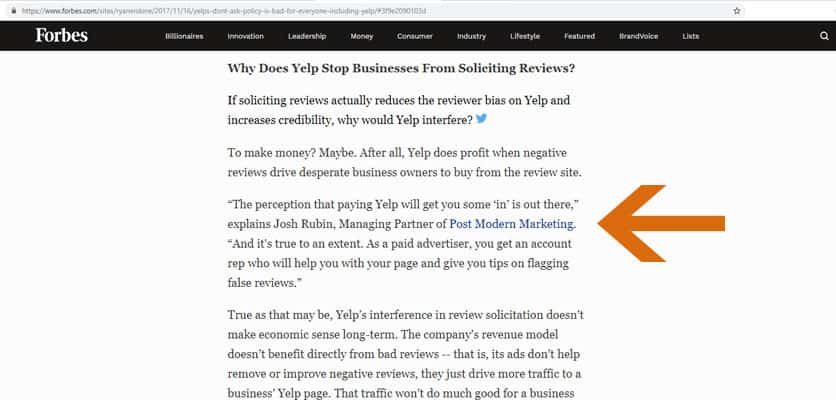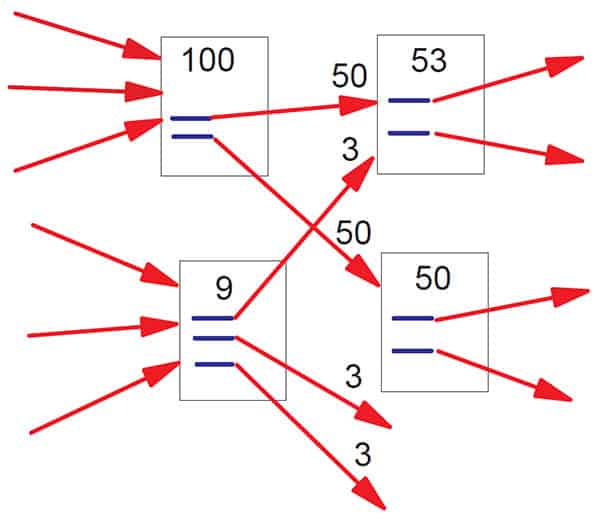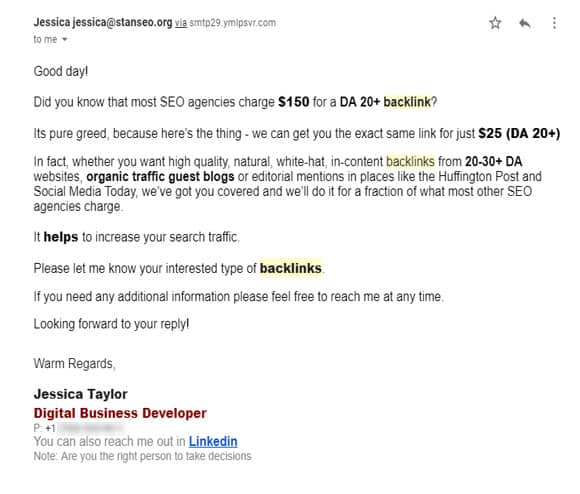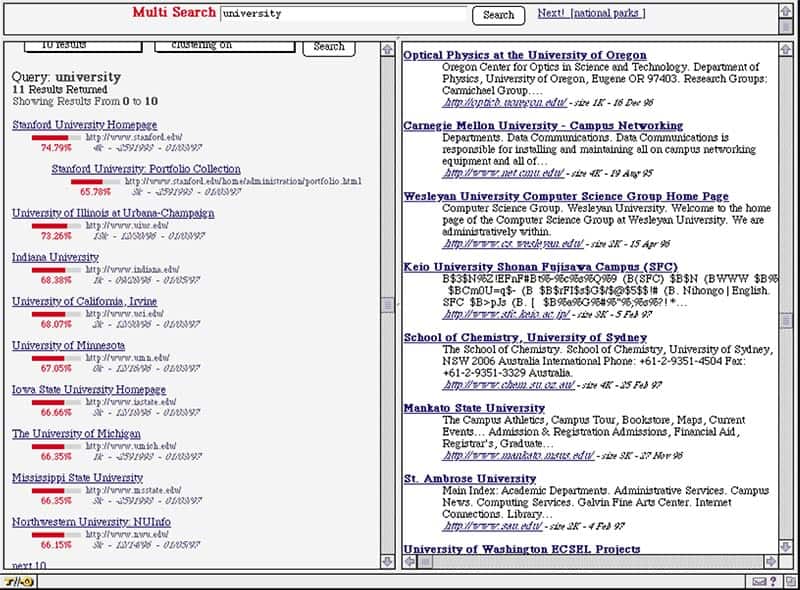What is a Backlink, and How do You Get One?
SEO experts have a really bad habit: They like to throw around jargon without making sure that their clients understand what they're talking about. Some do this intentionally.
It's a great way of papering over the fact that (a) they're inflating the value of their services, or (b) they use black hat techniques that will hurt their client. But in most cases, it’s simply that SEO folks fail to recognize the need to educate their clients, and the public.
One of the most common words that pops up in our industry is "backlinks." What are they? Why do they matter?
What is a backlink?
A backlink is any hyperlink on a website that points back to your website. It is a form of citation, in which someone talking about a topic related to you, your service, or your product wishes to refer to your website. Backlinks are one of many metrics used by Google to measure the value of a page. Backlinks are sometimes referred to as incoming links, inbound links, inlinks, or inward links.

Above is an example of a backlink that we received from an article on the website Forbes. In the page, the text “Post Modern Marketing” is a link that points to the homepage of our website, nowspeed.com. That link is an outgoing link for Forbes, but for our website it is an incoming link, or backlink.
Usually, linked text (sometimes referred to as "anchor text") is styled differently than the rest of the page text for easy identification. Often linked text will be a different color, underlined, or accompanied by an icon - all of these indicate that if you click a piece of linked text, you'll be taken to the page the text is referencing.
Backlinks are important for a number of reasons. The quality and quantity of pages linking to your website are some of the criteria used by search engines like Google to determine your ranking on their search engine results pages (SERPs). The higher you rank on a SERP, the better for your business, as people tend to click on the first few search results Google, Bing or another search engine generates in response to a search.
But, why do search engines care about backlinks? Well, in the early days of the Internet, search engines were very simple, and relied strictly on keyword matching. It didn’t matter how good the content on a website was, how popular it was, or what the website was for. If a phrase on a page matched a phrase that someone searched for, then that page would likely show up in the SERPs. That meant that if someone had an online journal in which they discussed at length how they had to take their car to a “car repair shop,” then people searching for a “car repair shop” would likely be led to that page. But, that isn't really useful for anyone trying to find a repair shop, right?
Well, to make things worse, website owners quickly realized they could exploit this weakness by resorting to “keyword stuffing,” a practice that involved creating websites with massive lists of keywords, plastered with banner ads. These websites existed for no other reason than to generate ad revenue.
This made search engines largely worthless, and weakened the usefulness of the Internet as a whole. How could this problem be fixed?
Backlinks Index
The Average Distribution of Backlinks
I was curious about what the balance of backlinks the most popular websites have. Basically, assuming that the most popular websites would be more natural in their link types and distribution, I could come up with a general idea of the proper link distribution a website should have.
Of course, this is just a general, bird's-eye look and is fairly flawed as a hard guideline; a local barbershop is going to have a vastly different link profile than a social media website (the intent of those linking to them would be very different), so don't take it as gospel.
I segmented different verticals, did a Google search to see which website ranked #1 for that query (keep in mind that I performed this search using a VPN and not at the targeted location to get 'cleaner' results, so yours would be different, especially for local types of businesses), added it to my list, and then averaged out the percentages of link types (which I pulled from ahrefs.com). Click the link below to see my dataset.
document: quick look at backlink distribution of leading sites
What are some average stats of backlink types?
Google was born out of the idea of quantifying the value of backlinks.
Back in the ‘90s, two students at Stanford named Larry Page and Sergey Brin started pondering how they could make a better search engine that didn’t get fooled by keyword stuffing. They realized that if you could measure the popularity of each website on the Web (and then cross index that with what each website was about), you could build a much more useful search engine. In 1998, they published a scientific paper in which they introduced the concept of “PageRank.” This topic was further explored in another paper that Brin and Page contributed to, “PageRank Citation Ranking: Bringing Order to the Web.”
As they noted in their paper, pages stuffed fulled of useless keywords, “Often wash out any results that a user is interested in.” While we often complain when we run into spammy pages today, the issue was far worse then. In the late '90s, the Internet had reached a breaking point.
In their paper they state, “As of November 1997, only one of the top four commercial search engines finds itself (returns its own search page in response to its name in the top ten results).” That’s incredibly difficult to imagine happening now. Imagine doing a Google search for the word “Google,” and not having Google.com show up in the first page of results. And yet, that’s how bad it was back in 1997.
But, PageRank changed everything.
PageRank was the product of two assumptions:
-
- If lots of websites all link to one website, then that one website is probably very good. The more backlinks pointing to a website, the better it must be.
-
- Not all websites are equal. Would you rather have a link from a 14-year-old's personal blog, or the front page of CNN or Fox News? Powerful websites likely won't link to poor quality websites. Thus, a link from such authoritative websites means that the linked-to site is very good.
With these assumptions in mind, in the PageRank system each website on the Web was assigned a value based upon how many websites linked to it. A website that had thousands of websites linking to it would have a huge score. A website with very few backlinks would have a small score.
Explaining PageRank

In this illustration from the \"PageRank Citation Ranking\" paper (yes, I know, it's clearly drawn in Microsoft Paint), the authors demonstrate how webpages pass value onto other pages. The two pages on the left have a value of 100 and 9, respectively. The page with a value of 100 has two links that point to the pages on the right. That page\'s value of 100 is divided between the two links, so that each conveys a value of 50. The other page on the left has three outgoing links, each carrying one-third of the page\'s value of 9. One link goes to the top page on the right, which ends up with a total value of 53. The bottom right page has no other backlinks, so its total value is 50.
Don't Build Backlinks for the Sake of Having More of Them
As a webmaster or business owner, you're going to get a plethora of emails or form submissions offering things like guest posting services, backlink building offers, offers to buy domains with a "high page rank" and whatnot - like the one right here I got just today. Don't entertain them! It's tempting to think that hey, "I can pay someone to build more backlinks to my website and reap the fruits of their labors... mwahaha" but 99% of those services are more trouble than they'll ever be worth. Why?
As Google becomes more and more sophisticated, one of the major cores of their algorithm, the one dealing with links (called Penguin) aims to value natural, quality links and devalue those unnatural or spammy ones. As a search engine, if they are to stay viable, they have to make sure their results are as honest and high-quality as possible, and that webmasters can't manipulate those results to their own benefit.
So, as you build a link, ask yourself, "am I doing this for the sake of my customer or as a normal marketing function?" If not, and you're buying a link, spamming blog comments, posting low-quality articles and whatnot, you risk Google penalizing you for your behavior. This could be as subtle as a drop in search ranking, or as harsh as a manual action, getting you removed from the search results altogether!

The Birth of the Modern Search Engine
For the purpose of their second paper, Brin, Page, and their coauthors took PageRank for a spin by incorporating it into an experimental search engine, and then compared its performance to AltaVista, one of the most popular search engines on the Web at that time. Their paper included a screenshot comparing the two engines’ search results for the word “university.”

The paper’s authors noted that AltaVista (on the right) returned a rather random assortment of search results: a random optical physics department within the University of Oregon, the campus networking group at Carnegie Mellon, Wesleyan’s computer science group, and then a page for one of the campuses of a Japanese university. Interestingly, none of the first six results is a college homepage.
This was symptomatic of the early history of the Web. Up through the mid-'90s, the only folks online were, well, nerds. As a result, despite the Internet having a more varied population by the late '90s, the nerds had a head start with webpages that had longer histories and were much more fleshed out. Thus, the pages for more science-oriented (cough dorky cough) college departments dominated Altavista's search results. You certainly don't see any English departments showing up.
But the PageRank system put a thumb on the scales, understanding by virtue of the Internet's network of backlinks that people cared about the homepages of universities a lot more when it came to a general query like "university." This is why all of the results returned by the PageRank engine (aside from a single secondary listing for the top result) are the homepages of major American universities. The results are much more logical and contextually appropriate.
Larry Page and Sergey Brin decided that the concept of PageRank showed real promise for cleaning up the Internet and making it more accessible, and they gave their little search engine a name: Google. You know the rest of the story.
Okay, backlinks are important. But how do you build them?
As you now know, Google looks at the number of backlinks and the quality of these links to determine the importance of a website. Consequently, SEO experts put a lot of effort into getting more backlinks for their customers. But there are good and bad ways of accomplishing this.
Building quality backlinks takes a lot of effort and time. This isn’t a one-and-done operation. This takes ongoing dedication and effort. Some examples of proper backlink building include:
Guest Posting & Blogging
Are there quality websites dedicated to your industry that accept guest articles? Try contacting them with the offer of one or more free articles on a relevant topic in exchange for a byline with a link back to your website.
But bear in mind that you can't guest post just anywhere and expect that it'll help. In fact, for years black hatters have perverted the value of guest posts by 'creating private blog networks,' which put out mass quantities of low-quality content for the sole purpose of exchanging backlinks. Google has caught on to this, and penalizes websites accordingly. So, you want to ensure that you only provide guest posts to reputable, respected websites that are relevant to your industry.
News Articles
Journalists and writers are always on the lookout for experts to contribute quotes for their articles. Some (but not all) will include backlinks to their sources’ websites. Getting quotes in media outlets is a great way to not only get backlinks, but also build credibility within your industry. Even in instances where you don't get backlinks, this profile page for PMM's CEO Josh Rubin is a good example of how you can showcase your media appearances - something which both Google and your clients value when it comes to evaluating your authority.
But how do you get quoted in news articles? Websites such as HARO and ProfNet can help you to connect with journalists who have specific needs, and there are other tools that allow you to send interesting pitches to writers. Even monitoring Twitter for relevant conversations between journalists can yield opportunities to connect with writers working on pieces involving your industry.
Local Citations
Business address listings on Google, Yelp, LinkedIn, Facebook, Yellow Pages, and elsewhere count as backlinks. Perhaps more importantly, they also go a long ways towards helping customers find your business! There are many, many such sites. A good way to approach this once you've gotten the biggies out of the way - Google should be your first priority - is to make a point of setting up a couple new citation profiles every week or so. Search around for updated lists of reputable business listing sites, and use it as a checklist.
Press Releases
If you aren't familiar with press releases, these are essentially advertisements in the form of news pieces that tout exciting new developments at your business. While press releases are more or less corporate propaganda, they are published on many prominent news sites with backlinks to your site.
However, not all press releases are created equal. Cheap press release services don’t publish anywhere that will get you worthwhile links. For this to work, you’ll have to work with high quality publishers such as Business Wire or PR Newswire. Beware: it will cost you dearly - about $1,000 for a 500 word press release.
But if you do it properly, it can be worth your money. Also, press releases can be much more than just a block of text. In December 2018, we ran a press release through Business Wire that had multiple backlinks, stylized call outs, and even a video! If you put effort into them, press releases can be not just a source of backlinks, but also serve as a great marketing piece as well.
Donations
Donating your time or money to local charities, organizations, and schools is actually a great - yet often overlooked - way of obtaining backlinks. Such organizations often have pages where they promote sponsors and donors, giving you the opportunity to net a backlink from a trusted organization. If such an organization has a donors section on their homepage, that's even better!
Directories
So, now we're getting to backlinks that have relatively little, or even negative value. The value of web directories has diminished dramatically in recent years. This shouldn't come as a surprise. After all, when was the last time that you used a web directory to find anything, rather than just doing a Google search? Google recognizes that directories don't have any real world worth, and so they don't accord much value to backlinks on them. But there is an exception to this rule. Submitting your website to local, industry-specific and niche directories can net you worthwhile backlinks. But if you can't imagine a circumstance where someone would use a certain directory, then it's probably not worth your time.
Paid Ad Links
When we talk about ad links, we're not talking about search ads on Google or Bing, or social media ads on Facebook or LinkedIn. We're talking about sites that charge a fee for post a backlink to your site, and which may or may not make it clear that the link is a paid advertisement. Technically, this is a grey or black hat area, as it more or less amounts to link farming when it's abused. Google describes such arrangements as "link schemes," and takes a pretty firm stance against them.
When done in a very selective and appropriate manner, such as by paying for advertising - that's clearly marked as such - on the website of a reputable industry organization, it can work well. Just be careful, as even these links may run afoul of Google's standards.
Social Media
Social media is a mixed bag when it comes to backlinks. There is a modicum of value, as social media sites allow you to link to your website in your profile. However, these days Facebook, Twitter, and other social media sites mark links as 'nofollow,' meaning that they don't pass SEO value (sometimes referred to as "link juice") to the linked site. These links won't do anything to boost your site's performance in search results.
Reciprocal Links
These are ‘tit-for-tat’ links. For instance, you make a deal with your friend who has a business website to have him place a link to your website, and in exchange your website links back to his. In the dark ages of SEO, this used to be somewhat effective. But these days, Google considers such 'link exchanges' to be link schemes, and you may get hit with a penalty if you're excessive and obvious about it. This isn't to say that swapping links is always bad, but if your only motive is SEO, then odds are that you shouldn't do it.
Blog/Forum Comments and Profiles
Many years ago, low-quality SEO firms loved to abuse the comments sections of blogs, forums, and news sites as a way to build backlinks for clients. This approach is pretty ineffective these days, as most reputable sites that are worth having backlinks on have responded to such abuse by making all such links 'nofollow.' While sites like Quora and industry-specific forums are great for sharing your expertise and raising your visibility, you're not going to get any SEO value from them.
How Do You Monitor Your Backlink Efforts?
When working on auditing your backlinks, or monitoring your building strategy, you're going to want some tools to monitor and value the links you get and the ones your competitors are getting. So, we recommend the following tools to help with this process:

Ahrefs is our first stop to check our backlinks. It seems to have the freshest database, and often catches links that we don't find in the other tools. It's a little pricey for an individual, however, but well worth it for any agency.

Google Search Console is the simple, free solution to get a general idea of what links you're building and, presumably, the ones Google is counting. I find the data we can access in our account is quite limited compared to the other tools, however.

Majestic SEO is the less expensive alternative to ahrefs, and still fairly decent as to the number of links it finds. It also uncovers ones that we don't see in the other tools, and once even helped me identify a negative SEO attack much earlier than I saw in the other tools.
Just do a quick Google search. If you're monitoring to see if a link you built is indexed, or just want to find other areas where you've been mentioned or linked, do a quick search with your company brand name, your web URL or other terms you're following. I've seen plenty of backlinks indexed by the search engine that never showed up in my search console account.